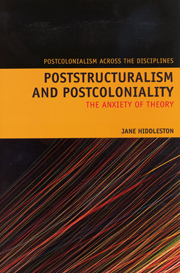Book contents
- Frontmatter
- Contents
- Acknowledgements
- Introduction
- Part One Poststructuralism in Algeria
- Part Two Theory and Cultural Difference
- 4 Displacing Barthes: Self, Other and the Theorist's Uneasy Belonging
- 5 National Identity and Etrangeté: Kristeva's Search for a Language of Otherness
- 6 Spivak's Echo: Autobiography, Narcissism and the Theoretical Voice
- Conclusion
- Bibliography
- Index
5 - National Identity and Etrangeté: Kristeva's Search for a Language of Otherness
from Part Two - Theory and Cultural Difference
- Frontmatter
- Contents
- Acknowledgements
- Introduction
- Part One Poststructuralism in Algeria
- Part Two Theory and Cultural Difference
- 4 Displacing Barthes: Self, Other and the Theorist's Uneasy Belonging
- 5 National Identity and Etrangeté: Kristeva's Search for a Language of Otherness
- 6 Spivak's Echo: Autobiography, Narcissism and the Theoretical Voice
- Conclusion
- Bibliography
- Index
Summary
Introduction: Des Chinoises
Julia Kristeva's work, like that of Barthes, has always been both idiosyncratic and contentious. Her interwoven engagements with semiotics, literary criticism, psychoanalysis, feminism and political thought have repeatedly aroused the ire of experts in these fields for skewing the agenda or using unconventional models and vocabulary. Frequently crossing boundaries between disciplines and genres, her writing seeks the unexpected in its attempt to respond to the demands of one school of thought with reference to the strategies of another. She applies the language of linguistics to literary study, for example, rewrites psychoanalysis from a feminist perspective, addresses political questions of national cohesion with reference to the Freudian unconscious, and finishes by channelling all these preoccupations through the psyche of the fictional detective, Stéphanie Delacour, in her novels. Underlying reflections on issues such as identity, femininity, social and familial relations, community and exclusion are translated into a variety of overlapping disciplinary languages, with the result that her corpus is both polyvalent and internally unified. Unsurprisingly, perhaps, this multifaceted approach has created stumbling blocks and, as Kelly Oliver aptly summarises in her opening to Reading Kristeva, plenty of critics have taken her to task for one reason or another.
- Type
- Chapter
- Information
- Poststructuralism and PostcolonialityThe Anxiety of Theory, pp. 125 - 150Publisher: Liverpool University PressPrint publication year: 2010

